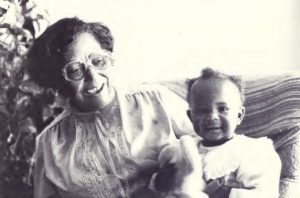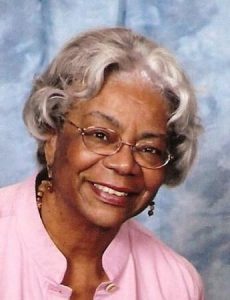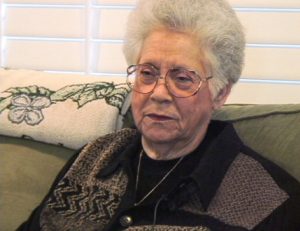Scholars from many fields will be interested in interviewees who recall their experiences of Juneteenth
“Juneteenth was usually two days of real fun. . . . For those big picnics, people would come from Dallas, Fort Worth, well, just from miles around. I would think hundred miles or two hundred miles. . . . That was a time of reunion when all the families would come back.”
So remembers Selena Foster, the daughter of sharecroppers from Cherokee County, Texas, who was interviewed for the Oral History Center’s On the Waterfront: Richmond, California Oral History Project. Foster went on to recall the barbecues, the ice cream, the best food she ever ate, the festivities, and the large family reunions.
This is the first year that Juneteenth is being observed as an official national holiday. Juneteenth commemorates that day on June 19, 1865, when union soldiers arrived in Galveston, Texas, and formally announced that slavery was over and enslaved people were free. The Oral History Center has three interviews with narrators who talk about Juneteenth. While the references to Juneteenth in these interviews are brief, they reveal something about each narrator – the pride of starting the first Juneteenth parade in Richmond, California; the happy memories of family reunions in Cherokee County, Texas; and the involved approach of a teacher with her preschool students’ families.
Beyond that, scholars from many disciplines will find much of interest in the oral histories of these three women from three different backgrounds, all of whom landed in the Bay Area. Scholars studying everything from African American history to urban development, women’s history, community history, demographics, early education, higher education, theater, migration, the World War II home front — the list goes on — will find something in these oral histories to enhance their research.
Find these and all our oral histories from the search feature on our home page. You can search by name, key word, and several other criteria.

Margaret Wilkerson: A Life in Theater and Higher Education

Margaret Wilkerson was interviewed as part of the UC Berkeley African American Faculty and Senior Staff Oral History Project. A scholar of theater with a focus on Black women playwrights including Lorraine Hansbury, Wilkerson served as chair of the UC Berkeley departments of Theater, Dance, and Performance Studies and African American Studies, and also served as director of Berkeley’s Center for the Study, Education, and Advancement of Women. In her oral history, Wilkerson discusses her childhood in an integrated community in Los Angeles, her life experiences, scholarship, and administrative work in higher education on behalf of equity and access.
Wilkerson, together with fellow UC Berkeley alum Lamarr Ferguson, organized the first Juneteenth parade in Richmond, California. It started as a small event through a local church, and was expanded to an annual citywide event through the City of Richmond that still takes place. Wilkerson recalls the first fair:
[We] picked up the kids and brought them down, and taught them about Juneteenth, and did makeup on their faces and things like that, and then took them back home. We had sent fliers out, delivered fliers in the neighborhood to let people know what was going to happen on that day and that we’d like to take the kids. We came down and they let us do it because we all lived in the neighborhood and they all knew us. I felt very proud that we did that for a couple of years and then after we stopped doing it, the City of Richmond picked that up and began to have a city-wide Juneteenth celebration.
Selena Foster: A Longtime Richmond Resident from Cherokee County, Texas
Selena Foster was interviewed as part of the On the Waterfront: Richmond, California Oral History Project. Born in 1916 in Texas to sharecroppers, Foster migrated to California in 1944, where her husband found work with the Kaiser Shipyards. Foster started out making donuts at a diner and soon after launched her own restaurant. In her oral history, Foster discusses her childhood in Texas, religion and church life, discrimination, housing, early Black families in Richmond, and Richmond’s development.
Foster details her childhood experiences in Cherokee County, Texas, and in that context recalled how important Juneteenth was in Texas and to her family. She remembers her family’s celebrations of the holiday:
Now, the Juneteenth, which is going to be celebrated here in Richmond this week, we had every year back there. That was one of the big celebrations in the middle of the year. Juneteenth was usually two days of real fun. The one day was getting everything ready and putting up the carnivals and then the big day of the celebration. My grandfathers all barbequed, and several other men that I know of there. They made their pits in the ground, unlike today. They would kill the cattle themselves. They would kill the beef off and wash it down and hang it and whatever they’d do to it, they say to tenderize it.
Then they would cook all night for two or three nights. That would be some of the best meat I ever ate in my life. And they had no ice and refrigeration. They would put the meat down in the well to cool it, to keep it from spoiling. That’s the way my grandmother used to do her butter.
So, for those big picnics, people would come from Dallas, Fort Worth, well, just from miles around. I would think hundred miles or two hundred miles. You would get to have that big reunion. That was a time of reunion when all the families would come back. My birthday, incidentally, is the twentieth of June. I always had a birthday party. I got ice cream for my birthday.
Sharon Fogelson: Rosie The Riveter World War II American Home Front Oral History Project

Sharon Fogelson was interviewed as part of the Rosie the Riveter World War II Home Front Oral History Project, in partnership with the National Park Service. Born in 1943, Fogelson was a preschool teacher and later head teacher with the Pullman School in Richmond, California. In her interview Fogelson discusses the changing demographics of Oakland and Richmond, where she lived and worked, in the several decades after WWII, as well as segregation and poverty in Richmond, shifts in federal funding for schools, early education, teaching methodology, standardized testing, and gender discrimination.
Fogelson talks about Juneteenth in the context of building rapport with the parents of her students. She explains that she would relate to parents through discussions of holidays, such as Thanksgiving and Juneteenth. Fogelson specifically references Richmond’s annual Juneteenth fair, the one that Wilkerson had founded.
If there was an event in the community, like they would have a Juneteenth fair at Nicholl Park, I would ask them, did they go to that? And if they haven’t been, next year they should try to make it a priority, because it’s a really exciting affair to go to, for your children, because there’s things there about your own culture. So we just talked about everything. If you make what some people call small talk with people, and they sort of get to know you, they start to build a trusting relationship with you. So then if something isn’t going right in their family, they feel more comfortable saying, “Do you have a couple minutes I could talk to you?” Because you don’t threaten them. They feel sort of like you’re almost a friend. So I’ve always found that you make conversation with whatever the parent is interested in talking about, and how important—
I don’t think sometimes people in education realize that a casual relationship and that daily interaction that you have — it’s something in elementary through high school — teachers don’t have the opportunity to do that.
These oral histories provide a glimpse into how the holiday of Juneteenth was valued and celebrated. Even more, the three narrators who recalled Juneteenth have much to share about the pressing social issues of their day — and ours.
You can find these and all our oral histories from the search feature on our home page. Just type a name or key word and click “search.” To ensure a full text search, on the next page scroll down and toggle on the button that says “full text.” If you’re interested in African American history in particular, see our related collection guide, A Host of Hidden Gems: Interviews with African Americans throughout the Oral History Center Collection. You can also visit all our collection guides and our projects page to find oral histories on specific subjects.
